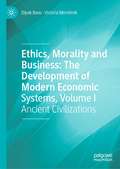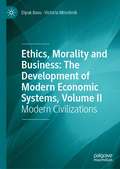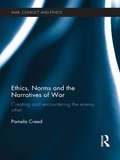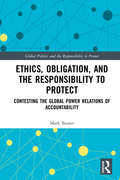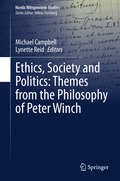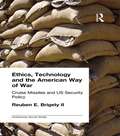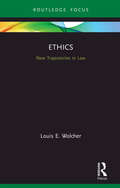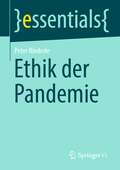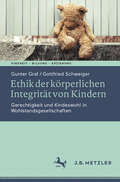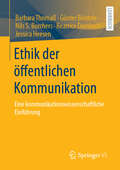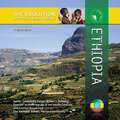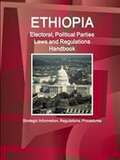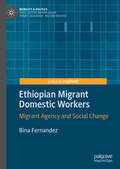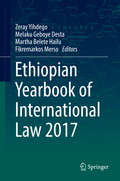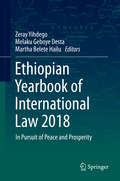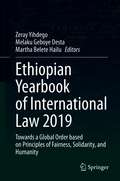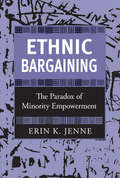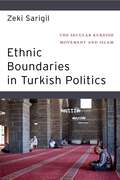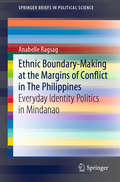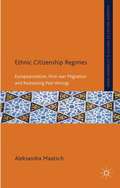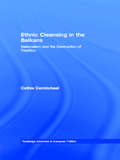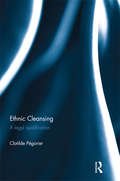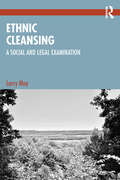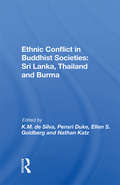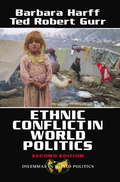- Table View
- List View
Ethics, Morality and Business: Ancient Civilizations
by Dipak Basu Victoria MiroshnikThis book, the first of two volumes, examines ancient civilizations to explore the ethical foundations of modern economic systems. The origin of ethical values is analyzed from a historical context and, through investigating the spread of the Aryan civilization from India into the rest of the world, the links between ancient Russia, India, Japan, and Greece are highlighted. By examining the business management in these societies, the development of an ethical system is explained.This book aims to highlight how trust is fundamental to transactions within an exchange economy. It will be relevant to those interested in economics, development studies, international relations, and global politics.
Ethics, Morality and Business: Modern Civilizations
by Dipak Basu Victoria MiroshnikThis book, the second of two volumes, is inspired by the famous philosopher of India, Kautilya, author of the first book on economics in the world, Arthashashtra. It analyzes the influence of ethical values from ancient societies on modern systems of management and economics. While this book deals with the “global sages” like Aristotle, Buddha, Jesus, the scope is also expanded to incorporate other notable modern thinkers like Karl Marx, Adam Smith, and Rabindranath Tagore. This book aims to highlight the interrelationships between ethics and management, both from a micro and macroeconomics, as well as organizational and national, perspective. It will be useful for those interested in history, economics, development studies, international relations, and global politics.
Ethics, Norms and the Narratives of War: Creating and Encountering the Enemy Other (War, Conflict and Ethics)
by Pamela CreedThis book examines the ethics and values that render a war discourse normative, and features the stories of American soldiers who fought in the Iraq War to show how this narrative can change. The invasion of Iraq, launched in March 2003, was led by the United States under the now discredited claim that Iraq was developing weapons of mass destruction (WMD). However, critical questions concerning what we may be able to learn from this experience remain largely unexplored. The focus of this book, therefore, is on soldiers as systems of war – and the internal battle many of them wage as they live a reality that slowly emerges as inconsistent with familiar beliefs and value commitments. This work offers a reflective study of identity struggle from the perspective of emotional psychology and delves into the ‘narrative field’ of socio-politics. Going beyond the political contestations over the U.S. military intervention in Iraq, the author analyses original research on the evolving beliefs and value-commitments of veterans of the war, exploring their faith in its ‘just cause’ and their personal sense of self and national identity. This book will be of much interest to students of the Iraq War, US foreign policy, military studies, discourse analysis, and IR in general.
Ethics, Obligation, and the Responsibility to Protect: Contesting the Global Power Relations of Accountability (Global Politics and the Responsibility to Protect)
by Mark BusserThis book critically examines arguments about ‘obligation’ and ‘responsibility’ in relation to the responsibility to protect (R2P) and situates it within wider moral argumentation concerning the role of culpability, answerability, and human rights in international affairs. It discusses the ways in which R2P has been imagined and contested in order to illuminate some possible trajectories through which its potential might be actualized. Crucial to the development of a more ‘responsible’ world politics will be the recognition that formal inter-state ‘regimes’ of responsibility will need to be embedded within wider social ‘fields’ of responsibility constituted by the participation of attentive and mobilized global citizens ready to hold elites accountable. This book provides novel ideas to better understand the role of rhetoric and moral argumentation in international relations. Much of the novel contribution comes in the form of its conceptual breakdown of the ambiguous concept of ‘responsibility,' which often clouds clear understanding not only in international relations, but also in the specific debates over the ethics and practice of the international responsibility to protect regime. This book will be of much interest to students of the responsibility to protect, human rights, global governance, and international relations in general.
Ethics, Society and Politics: Themes from the Philosophy of Peter Winch (Nordic Wittgenstein Studies #6)
by Michael Campbell Lynette ReidThis volume is a reappraisal of the work of Peter Guy Winch (1926 -1997), one of the most important philosophers of the 20th Century. Winch faded into relative obscurity compared to his contemporaries due to a mistaken belief that there are no systematic connections between the different aspects of his work. This volume corrects that presupposition and reintroduces Winch's work to a new generation of scholars. By showing how ethical, political and social issues are interrelated in Winch's work, and by making clear the connections between these issues and themes in metaphysics and the philosophy of mind, the volume demonstrates both the breadth and the unity of Winch's approach. It discusses topics such as ethics, political philosophy, social science, the philosophy of action, the philosophy of mind, metaphysics, and the philosophy of language. Despite this apparent variety of topics, the contributors to the volume share Winch's conviction that the different areas of philosophy are interdependent. As a result, the volume as a whole shows unity in diversity and provides an example of a manner of philosophising in which different approaches and sub-disciplines are placed in dialogue with each other. Peter Guy Winch is most famous for his early work on the philosophy of the social sciences. His On the Idea of a Social Science and its Relation to Philosophy (ISS) generated controversy within both philosophical and social scientific circles. In that work and subsequent publications Winch argued against the presupposition that social relations could be understood using the conceptual tools of the natural sciences. Winch would later describe ISS as a 'young man's book' and would come to regret the reputation it garnered him - a mixture of roughly equal degrees fame and infamy. Alongside his work on the philosophy of social sciences, Winch was an interpreter and exegete of Wittgenstein. He also published a ground-breaking study of the philosophy of Simone Weil, entitled Simone Weil: The Just Balance. Winch also published numerous essays on issues in ethics, political philosophy and the philosophy of religion, and at his death was working on a book manuscript on the problem of political authority.
Ethics, Technology and the American Way of War: Cruise Missiles and US Security Policy (Contemporary Security Studies)
by Reuben E. Brigety IIA new investigation into how the advent of precision-guided munitions affects the likelihood of US policy makers to use force. As such, this is an inquiry into the impact of ethics, strategy and military technology on the decision calculus of national leaders. Following the first Gulf War in 1991, this new study shows how US Presidents increasingly used stand-off precision guided munitions (or "PGMs", especially the Tomahawk cruise missile) either to influence foreign adversaries to make specific policy choices or to signal displeasure with their actions. Such uses of force are attractive because they can lead to desirable policy outcomes where conventional diplomacy has failed but without the large cost of lives, economic resources, or political capital that result from large-scale military operations. In a post-9/11 world, understanding alternative uses of force under significant policy constraints is still of supreme importance.
Ethics: New Trajectories in Law (New Trajectories in Law)
by Louis E. WolcherThis book examines ethics at the intersection of law and justice. If law and justice are concerned with collectively establishing the general terms on which the plurality called "we" share the earth as social beings, then ethics concerns the individual Self’s particular moral relationship with the Other. Law, the acknowledged offspring of politics, represents the kind of might that most people accept as legitimate, at least most of the time. Justice, on the other hand, is supposed to vigilantly stand guard over law: to protect us against its biases and excesses, or, at the very least, to rise up and reproach the law whenever it permits or encourages injustice. But what if the belief that a particular legally-authorized state of affairs is "just" – a common enough feeling, especially amongst the privileged – or even "unjust" and in need of correction, were itself in need of a vigilant guardian? This book argues that ethics can and should stand guard over whatever image of justice and/or just law one happens to believe in. The book thus attempts to steer a perilous course between two looming moral hazards: ethics interpreted as the rational production of ethically correct behavior (as in Kant) and ethics interpreted as the spontaneous eruption of pre-rational compassion for the suffering of the Other, come what may (as in Levinas). In the end, the book characterizes ethical life in the law as the more-or-less constant experience of the paradoxical nature of this choice – a feeling of inescapable personal responsibility for the fate of the Other. Based on the author’s well-established expertise in the area, this book will appeal to students, scholars and others with interests in legal theory and moral and political philosophy.
Ethik der Pandemie (essentials)
by Peter RinderleDie Corona-Krise zwingt uns zu gewaltigen Veränderungen unserer privaten Lebensführung und erfordert höchst umstrittene politische Maßnahmen zum Schutz der Gesundheit und zur Verteilung knapper Ressourcen. Sie verlangt große Anstrengungen von den Wissenschaften, und sie hat nicht zuletzt erhebliche Auswirkungen auf die kulturelle Identität von Gemeinschaften. Dieses Büchlein gibt einen Überblick über die wichtigsten Fragen und Probleme, die eine globale Pandemie für die philosophische Ethik aufwirft. Nach einer Analyse des Begriffs und des Werts der Gesundheit präsentiert und bewertet es die prominentesten Lösungsvorschläge und soll mit einer Reflexion über die Forderungen der Gerechtigkeit und die Inhalte eines guten Lebens zur Orientierung unseres persönlichen und politischen Handelns beitragen.
Ethik der körperlichen Integrität von Kindern: Gerechtigkeit und Kindeswohl in Wohlstandsgesellschaften (Kindheit – Bildung – Erziehung. Philosophische Perspektiven)
by Gunter Graf Gottfried SchweigerDieses Buch befasst sich mit der Gefährdung des Körpers von Kindern in Wohlstandsgesellschaften. Die körperliche Unversehrtheit ist ein wichtiger Teil des körperlichen und seelischen Wohlbefindens eines Kindes, aber sie kann auch durch verschiedene Bedrohungen in der Kindheit verletzt werden; dies beeinträchtigt nicht nur die körperliche Gesundheit, sondern verursacht auch seelische Schäden und führt zu Verzerrungen in der Entwicklung des Selbst. Die Autoren gehen auf drei Bereiche ein, die unterschiedlich schwerwiegende Gefährdungen darstellen: (1) Körper und Essen, (2) Körper und Sexualität, und (3) Körper und Gewalt. Durch eine eingehende Auseinandersetzung mit dem vorhandenen theoretischen und empirischen Wissen sowie eine gründliche ethische Analyse werden die zentralen Ungerechtigkeiten in den genannten Bereichen identifiziert und die Akteure mit Verantwortung gegenüber Kindern aufgezeigt. Abschließend geben die Autoren einen wertvollen Einblick in die Notwendigkeit einer ethischen Grundlage für Maßnahmen zum Schutz von Kindern und ihren Körpern.
Ethik der öffentlichen Kommunikation: Eine kommunikationswissenschaftliche Einführung
by Beatrice Dernbach Günter Bentele Jessica Heesen Barbara Thomaß Nils S. BorchersDas Lehrbuch führt auf kommunikationswissenschaftlicher Grundlage in die Theorie, Methodik und das Leistungsvermögen der Ethik öffentlicher Kommunikation ein. Es wendet die grundlegenden Erkenntnisse ethischer Reflexion auf relevante Berufsfelder der öffentlichen Kommunikation an (Journalismus, Public Relations, Werbung), berücksichtigt aber auch die nicht-professionelle öffentliche Kommunikation im Digitalen. Es liefert Orientierungswissen für künftige (und gegenwärtige) Angehörige dieser Berufsfelder und derer, die an der gesellschaftlichen Kommunikation teilnehmen. Es orientiert sich an der Berufspraxis ebenso wie an begründeten normativen Erfordernissen.
Ethiopia (The Evolution of Africa's Major Nations)
by Jim CorriganEthiopia, unlike most African countries, remained mostly free from European colonial influence. This landlocked country in East Africa had been the site of a powerful ancient kingdom, which was overthrown by a military coup in 1974. A socialist government was established, under which millions of Ethiopians starved during the famines of the 1970s and 1980s. Rebel groups initiated a civil war and overthrew the government in 1991. Although Ethiopia adopted a new constitution in 1994 and held democratic elections the next year, the country is not truly a democracy. Instead, Ethiopia's government has been recognized as an authoritarian regime that uses force to stifle dissent. Ethiopia's economy grew rapidly in the late 2000s, but the country's people are among the poorest in Africa. In addition, a terrible drought in 2011 has caused a food crisis that threatens the lives of many people.
Ethiopia Electoral, Political Parties Laws and Regulations Handbook: Strategic Information, Regulations, Procedures
by International Business Publications UsaEthiopia Electoral, Political Parties Laws and Regulations Handbook: Strategic Information, Regulations, Procedures
Ethiopian Migrant Domestic Workers: Migrant Agency and Social Change (Mobility & Politics)
by Bina FernandezThis book tells the stories of the Ethiopian women who migrate to work as domestic workers in the Middle East. Drawing on qualitative research in Ethiopia, Lebanon and Kuwait, the author reveals how women’s aspirations to migrate are constituted within unequal gendered structures of opportunity in Ethiopia and asks us to consider how gender, race, class and nationality intersect in the construction of migrant subjectivities and agency. By analysing the impact of migration on social reproduction both in Ethiopia and the destination countries, the book offers fresh empirical and theoretical insights into the largest stream of women’s autonomous international migration from Africa.
Ethiopian Yearbook of International Law 2017 (Ethiopian Yearbook of International Law #2017)
by Zeray Yihdego Melaku Geboye Desta Fikremarkos Merso Martha Belete HailuThe second volume of EtYIL brings together a number of articles and other contributions that, collectively, take EtYIL’s original mission of helping rebalance the narrative of international law another step forward. Like the first volume, this book presents scholarly contributions on cutting-edge issues of international law that are of particular interest to Ethiopia and its sub-region, as well as Africa and developing countries more generally. The major issues tackled include the interplay between national and international in the promotion and regulation of foreign direct investment in Ethiopia; the regulatory framework for the exploitation and development of petroleum resources and relevant arbitral jurisprudence in the field; the role of international law in ensuring the equitable sharing of transboundary resources, such as the waters of the River Nile, or in the delimitation of the continental shelf in the region; the efforts to establish the Continental Free Trade Area in Africa and the lessons that can be learnt from prior experiments; Africa’s policy towards the International Criminal Court and the feasibility of alternative means of serving justice in the case of grave crimes; and the UN’s peace-keeping operations in their North-South context. The issues addressed in the various contributions are mostly at the heart of live political, diplomatic and judicial activities today, and as such promise to shape the future of international law in the region and beyond. This volume not only takes a significant step further towards EtYIL’s mission, but also enriches it with fresh insights from perspectives that are not common in international law scholarship to this day.
Ethiopian Yearbook of International Law 2018: In Pursuit of Peace and Prosperity (Ethiopian Yearbook of International Law #2018)
by Zeray Yihdego Melaku Geboye Desta Martha Belete HailuEtYIL 2018 comes at a time when multilateralism and its underpinning norms of international law and institutions are under siege. At the same time, in 2018, Africa stood out for upholding multilateralism and international law. From the adoption of the Agreement establishing the African Continental Free Trade Area to the signing of peace agreements that brought to an end two decades of hostilities between Eritrea and Ethiopia, 2018 was indeed a remarkable year for international law in Africa. EtYIL 2018 covers some of these issues, including the Eritrea-Ethiopia Claims Commission decisions on jus ad bellum, jus in bello, evidentiary and procedural matters and the role of arbitration in upholding the international rule of law. Such new developments as the lifting of UN sanctions against Eritrea and the agreements signed between Eritrea and Ethiopia are also covered in this volume. The volume further devotes considerable attention to other legal issues including: the use and misuse of European patent law to the detriment of developing countries’ interests, sharing transboundary resources, production sharing agreements on extractives , evolving rules governing economic relations between Africa and the European Union in the context of Brexit, contract-farming in the African cocoa and chocolate industry, the International Criminal Court and human rights law, and cyber-attacks and the role of international law in tackling them. These chapters, authored by experts from Africa, Asia, Europe and North America not only bring new and diverse voices to the international law discourse; they also contribute to EtYIL’s overarching goal of contributing to the effort to rebalance the narrative of international law.
Ethiopian Yearbook of International Law 2019: Towards a Global Order based on Principles of Fairness, Solidarity, and Humanity (Ethiopian Yearbook of International Law #2019)
by Zeray Yihdego Melaku Geboye Desta Martha Belete HailuEtYIL 2019 comes out while the world is in the midst of a new coronavirus pandemic that has infected millions and killed thousands of people without distinction as to age, race, colour, or creed. As an attack on all humanity, Covid-19, the disease caused by the coronavirus, has challenged the fitness of the global order as never before, and its institutional and normative frameworks have been found wanting. As is often the case in such circumstances, when the WHO is denied resources to assist those countries or the WTO is unable to guarantee access to Covid-19 medical supplies and protective equipment, it is the poorest nations that suffer the most. EtYIL’s mission is to provide a platform for purpose-oriented scholarly analysis and debate on issues of particular significance for African countries such as Covid-19, disputes over Nile water resources, and Ethiopia-Eritrea relations. Although the pandemic came too late for this issue of EtYIL, we have managed to include two important articles that examine the subject from geostrategic and legal perspectives. EtYIL 2019 also addresses a number of other topical issues, including the responsibility of the UN Security Council (UNSC) in climate-related risks to least developed countries, the Global South’s approach to environmental protection, the challenges of international regulation of arms brokering, and the contributions of Martin Luther King, Jr. to Pan-Africanism and international human rights law. Finally, the Yearbook also continues its coverage of regional issues such as the evolving Ethiopia-Eritrea relations, Djibouti’s accession to the ICSID Convention; the trilateral negotiations between Ethiopia, Sudan and Egypt over the Grand Ethiopian Renaissance Dam and the U.S. meddling and the role of the UNSC on the issue have also been covered. As before, our contributors come from all over the world, to all of whom we extend our sincere appreciations.
Ethnic Bargaining: The Paradox of Minority Empowerment
by Erin K. JenneIn Ethnic Bargaining, Erin K. Jenne introduces a theory of minority politics that blends comparative analysis and field research in the postcommunist countries of East Central Europe with insights from rational choice. Jenne finds that claims by ethnic minorities have become more frequent since 1945 even though nation-states have been on the whole more responsive to groups than in earlier periods. Minorities that perceive an increase in their bargaining power will tend to radicalize their demands, she argues, from affirmative action to regional autonomy to secession, in an effort to attract ever greater concessions from the central government.The language of self-determination and minority rights originally adopted by the Great Powers to redraw boundaries after World War I was later used to facilitate the process of decolonization. Jenne believes that in the 1960s various ethnic minorities began to use the same discourse to pressure national governments into transfer payments and power-sharing arrangements. Violence against minorities was actually in some cases fueled by this politicization of ethnic difference.Jenne uses a rationalist theory of bargaining to examine the dynamics of ethnic cleavage in the cases of the Sudeten Germans in interwar Czechoslovakia; Slovaks and Moravians in postcommunist Czechoslovakia; the Hungarians in Romania, Slovakia, and Vojvodina; and the Albanians in Kosovo. Throughout Ethnic Bargaining, she challenges the conventional wisdom that partisan intervention is an effective mechanism for protecting minorities and preventing or resolving internal conflict.
Ethnic Boundaries in Turkish Politics: The Secular Kurdish Movement and Islam
by Zeki SarigilThe Kurdish Movement in Turkey’s growing alliance with Islam One of the fault lines of Turkish politics traditionally has been the divide between religious and secular movements. However, as Zeki Sarigil argues, the secular Kurdish movement in Turkey has increasingly become aligned with Islam. As a result, Islam has become part of the movement’s political discourse, strategies and actions. Ethnic Boundaries in Turkish Politics traces the evolving relations between the leftist, secular Kurdish movement and Islam, from an apathetic and/or antagonistic attitude in the 1970s and 1980s to an increasingly Islam-friendly approach in the 1990s to an attitude of accommodation and the rise of Kurdish-Islamic synthesis in the early 2000s. Based on 104 interviews in several provinces in Turkey (primarily Ankara, Diyarbakir, Istanbul, and Tunceli) between 2011 and 2015 as well as ethnographic data, public opinion surveys and statements from the Kurdistan Workers’ Party (PKK) and Kurdish leaders, Sarigil shows how the secular Kurdish movement increasingly has been endorsing Islam and Islamic actors. The reasons for this Islamic opening are global, national, and local; Sarigil demonstrates that a group of strategic and ideological factors have encouraged and/or forced Kurdish leaders to redraw symbolic and social boundaries of the movement. Namely, with the end of the Cold War support for Marxist ideas collapsed, creating increasingly more favorable responses towards religion. In addition, the movement’s need to expand its social basis and popularity; electoral politics; and legitimacy struggles against rival political actors were other major factors, which triggered the Kurdish movement’s boundary expansion (i.e. its Islamic opening). The study also shows that the Kurdish boundary making was not without any tension or contestation. The boundary expansion by Kurdish ethnopolitical elites triggered both internal and external boundary contestations. The movement’s embrace of Islam on a more widespread level has major ramifications for politics in Turkey and in the region. Ethnic Boundaries in Turkish Politics has important insight into the PKK, modern Turkish and Islamic societies and highlights the increasing role of Islam in global politics.
Ethnic Boundary-Making at the Margins of Conflict in The Philippines: Everyday Identity Politics in Mindanao (SpringerBriefs in Political Science)
by Anabelle RagsagThis book makes a significant interdisciplinary contribution to existing scholarship on ethnicity, conflict, nation-making, colonial history and religious minorities in the Philippines, which has been confronted with innumerable issues relating to their ethnic and religious minority populations. Using Sarangani Bay as a research site, the book zones in on the lives of the Muslim Sinamas and the Christianized indigenous B'laans as they navigate the effects of the ongoing turmoil in the Bangsamoro region in Muslim Mindanao—a multi-faceted conflict involving numerous armed groups, as well as clans, criminal gangs and political elites. This work considers the factors affecting the Muslim Moro people, who have long been struggling for their right to self-determination. The conflict in the Moro areas has evolved over the past five decades from an ethnonationalist struggle between an aggrieved minority and a thorny issue for the central government: a highly fragmented conflict with multiple overlapping causes of violence. The book provides a framework for understanding the ethnic separatism in the case of the southern part of the country, framed by the concept of ethnic boundaries. Providing an excellent blend of theory and empirical evidence, the author confronts how ethno-religious divisions adversely impact the quality of life and unpacks how these divisions challenge multiculturalist policies. Weaving together multiple branches of the social sciences, this book is of interest to policymakers, researchers and students interested in international relations and political science, Asian studies, ethnic studies, Philippines’ history, sociology and anthropology.
Ethnic Citizenship Regimes
by Aleksandra MaatschThis book sheds light on the processes that have transformed national citizenship of the European Union's member states and explains the legislative changes that have taken place since the mid-1980s in Germany, Hungary and Poland.
Ethnic Cleansing in the Balkans: Nationalism and the Destruction of Tradition (Routledge Advances in European Politics)
by Cathie CarmichaelEthnic Cleansing in the Balkans looks at the phenomenon of ethnic cleansing in the Balkans over the last two hundred years. It argues that the events that occurred during this time can be demystified, that the South East of Europe was not destined to become violent and that constructions of the Balkans as endemically violent misses a important political point and historical point.Carmichael provides an account of ethnic cleansing in the Balkans as a single historical phenomenon and brings together a vast array of primary and secondary sources to produce a concise and accessible argument. This book will be of interest to students and researchers of European studies, history and comparative politics.
Ethnic Cleansing: A Legal Qualification
by Clotilde PegorierThis book confronts the problem of the legal uncertainty surrounding the definition and classification of ethnic cleansing, exploring whether the use of the term ethnic cleansing constitutes a valuable contribution to legal understanding and praxis. The premise underlying this book is that acts of ethnic cleansing are, first and foremost, a criminal issue and must therefore be precisely placed within the context of the international law order. In particular, it addresses the question of the specificity of the act and its relation to existing categories of international crime, exploring the relationship between ethnic cleansing and genocide, but also extending to war crimes and crimes against humanity. The book goes on to show how the current understanding of ethnic cleansing singularly fails to provide an efficient instrument for identification, and argues that the act, in having its own distinctive characteristics, conditions and exigencies, ought to be granted its own classification as a specific independent crime. Ethnic Cleansing: A Legal Qualification, will be of particular interest to students and scholars of International Law and Political Science.
Ethnic Cleansing: A Social and Legal Examination
by Larry MayPutting forward the argument that the strength of democracies can be measured in how well minorities – especially ethnic and racial minorities – are treated by the majority, Larry May’s Ethnic Cleansing maintains that unjust ethnic cleansing is one of the greatest internal challenges to the modern institutions of pluralistic and multicultural states.In order to determine what constitutes the crime of ethnic cleansing, this book details crucial conceptual issues around the topic, such as what ethnicity means, what ethnic cleansing claims to achieve, why these acts are invariably harmful, and the conditions of restitution, reparation, and reconciliation – affirming that ethnic cleansing must be countered by existing institutions such as the International Criminal Court, which is uniquely situated to prosecute ethnic cleansing.The first major study to analyze ethnic cleansing from an explicitly normative and conceptual perspective in the last decade, the increase in number and complexity of cases of ethnic cleansing makes this a timely book to understand the challenges that confront contemporary society.
Ethnic Conflict In Buddhist Societies: Sri Lanka, Thailand, Burma
by Kinglsey M. De SilvaThis volume contains a selection of the papers presented at a South and South-east Asia regional workshop on 'Minorities in Buddhist Polities: Sri Lanka, Thailand and Burma', organised by the International Centre for Ethnic Studies (ICES), Sri Lanka, and the Thai Studies Programme of Chulalongkorn University, Thailand. The tenor for 'Minorities
Ethnic Conflict In World Politics
by Barbara Harff Ted Robert GurrThis second edition of Ethnic Conflict in World Politics is an introduction to a new era in which civil society, states, and international actors attempt to channel ethnic challenges to world order and security into conventional politics. From Africa's post-colonial rebellions in the 1960s and 1970s to anti-immigrant violence in the 1990s the authors survey the historical, geographic, and cultural diversity of ethnopolitical conflict. Using an analytical model to elucidate four well-chosen case studies-the Kurds, the Miskitos, the Chinese in Malaysia, and the Turks in Germany-the authors give students tools for analyzing emerging conflicts based on the demands of nationalists, indigenous peoples, and immigrant minorities throughout the world. The international community has begun to respond more quickly and constructively to these conflicts than it did to civil wars in divided Yugoslavia and genocide in Rwanda by using the emerging doctrines of proactive peacemaking and peace enforcement that are detailed in this book. Concludes by identifying five principles of international doctrine for managing conflict in ethnically diverse societies. The text is illustrated with maps, tables, and figures.
